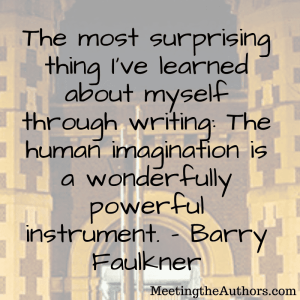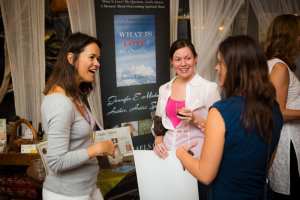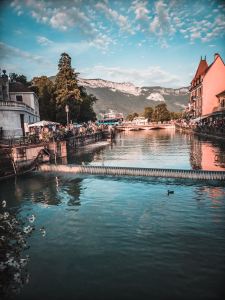
Today we travel to a beachside suburb of Adelaide, the capital city of South Australia, to chat with H.R. Kemp about how a sheep farm, picking cherries, being a Statistician, the Adelaide Writers’ festival, sunburst diagrams, a messy desk, and collecting newspaper clippings fit into her current and past life.
Tell us a bit about yourself.
I’m an Australian author and I live in a beachside suburb of Adelaide, the capital city of South Australia. We have great beaches, wonderful wine regions and a great arts community, and I take full advantage of having them close and within easy reach. I grew up in a country area just outside Melbourne and my family moved a lot; hence I lived on a variety of different properties: a horse farm, a dairy farm, and a sheep farm before we finally settled on a small acreage with goats, loganberries and fruit trees. My school holidays were spent picking fruit, mostly cherries, for pocket money (although I didn’t earn much, I tended to eat more than I put in the basket resulting in many tummy aches.)
My first degree was a Bachelor of Science, Chemistry and a few years later I gained a Graduate Diploma in Education. Besides the usual casual jobs, I spent most of my working life as a public servant working in several different government departments and my career spanned roles as diverse as Management Trainer, Team Facilitator, Statistician and Laboratory Assistant.
In 2011, I got serious and successfully completed a Graduate Certificate in Creative Writing at Adelaide University. I’ve completed many short courses at Writers SA and WEA (and still do). Recently, several of my short stories have been published, most notably one was included in the anthology, When Stars Will Shine. Two others were published in The Writers’ and Readers’ Magazine, Jan 2020 & Oct 2019 and another was previously published in the anthology, Fledglings, by Birdcatcher Books, July 2016.
Besides writing, my passion for travelling and discovering new places means I have visited many fabulous countries and cities around the world. I’m an avid theatre-goer, enjoy art exhibitions and galleries, and of course, I love to read. In March each year, I take full advantage of the Adelaide Writers’ festival to discover new authors and to hear my favourites.
In which genre do you write?
My novel, Deadly Secrets, is a socio-political thriller, with suspense and mystery. It is a multi-layered thriller and the plot weaves together several threads. My protagonists are ordinary people who are stretched by extraordinary issues. They’re not government agents, spies or professional advocates nor are they gun-toting police officers but everyday people who become embroiled in a powerful conspiracy and need to make choices.
My short stories, however, are more focused on the human dilemma and relationship issues and don’t have the thriller element.
How many published books do you have?
Just one, although, I have a second novel at the first draft stage.
When did you first realize you wanted to be a writer and what ignited your author’s flame?
I’m not sure there was a single time or moment that I can identify. I’ve been an avid reader all my life. When I was young, I wrote mystery stories for my little brother’s entertainment. As a teenager and young adult, I wrote (bad) poetry and (equally bad) short stories. I’ve scribbled snippets of stories and scenes all my life but they rarely ended up in any coherent piece of work (it was fascinating cleaning out the desk drawer when I retired). It wasn’t until I retired that I had the time, brain-space and determination to take it seriously.
What is an interesting writing quirk you have, that we wouldn’t know by reading your biography?
I used sunburst diagrams as a tool for facilitating groups. They look pretty, but they’re also functional. I now use them when I first plan my novel to identify different plot threads, sub-plots, who, what, where, and the connections and overlaps.
What does your ideal writing space look like?
Not at all like my desk. I often write while sitting in my local café, it involves coffee, background chatter and soft music and works well for me. I dream of going on a writing retreat to somewhere exotic: France, Spain, a tropical Island; but I fear I wouldn’t actually get much writing done. My rather messy desk (I’m normally a tidy person but piles of notes, newspaper cuttings and notebooks overflow my writing space) will have to do.
What are you currently reading?
I have an entire tall bookcase of books to be read. I keep promising that I won’t buy any more, but it’s a promise I find much too hard to keep. I have just begun Lock by Andrew Barret, and The Secret Pilgrim by John Le Carré.
Where did the idea for your most recent book come from?
I collect newspaper clippings, non-fiction books on a range of topics and I often wake in the early hours with ideas or character profiles. (Luckily I keep a notebook and pen by the side of my bed to capture these, although reading what I wrote in the dark is a challenge.) Deadly Secrets grew from my ‘what if’ musings about the world’s political landscape leading up to 2009. Issues like asylum seekers, climate change and corporate misconduct, all feed into the plot.
What do you do when not writing or marketing your books?
I pick up grandchildren from school a couple of times a week and my time with them is precious. Spending time with family and friends is a big part of my life; it made the pandemic social-distancing hard. I love walks on the beach, day trips to wine districts, going to the theatre or art exhibitions, and doing the newspaper Sudoku/crossword/9 letter word puzzles.
What is the most surprising thing you’ve learned about yourself through writing?
Although I love to talk and write, I have such clear visual images of scenes and characters in my head. When I’m writing, I can see the setting, the people and hear the dialogue.
What is the most enjoyable thing you’ve found through writing?
The helpfulness and support of the writing community has amazed me. I’ve made friends from around the globe, connecting through our love of writing and our willingness to share, help each other, and offer critiques and advice.

What’s the strangest thing you’ve done or experienced to help create a scene?
For research, I sat in on a court trial of four bikie gang members, charged with kidnapping, assault and belonging to an illegal organisation. It was fascinating to watch the process from beginning to end (although I didn’t go every day) and to observe the jury, judge, the accused, their family members, and barristers in action. I chatted to other observers (often law students) and some of the police officers who were following the trial. I filled an entire notebook with notes.
Do you journal write or keep a personal diary? Has this helped with your published writings? If so, how?
I only write a diary when I travel. Every day, I fill pages with detail, impressions and thoughts. It’s the perfect accompaniment to the thousands of photos I take. Some might call it obsessive, but my travels are the one thing I get nostalgic about. I also draw on the details to write scenes. In Deadly Secrets, besides Adelaide and Sydney, there are scenes set in Paris, Normandy, Nice and Barcelona.
List 3 interesting facts about yourself.
– I have difficulty selecting a favourite in anything. Even my crockery is a collection of oddments. I like all the different patterns and I don’t have to pick only one.
– I love languages. I speak some French and German and have done short introductory language courses in Italian, Spanish and Greek.
– I lived in France for 6 months in 2009. It was a long-term dream come true.
What are you currently working on?
I am editing and rewriting the first draft of a second political thriller, another stand-alone story set in 2006.
Tell us about your most recent book.
Deadly Secrets, a socio-political thriller, was released end of March and is available in both paperback and ebook. This novel has mystery, drama, and suspense. It’s a story of fighting the odds to do what’s right.
Shelley and her friends uncover an extraordinary conspiracy. Their choice is; stay silent and condone unspeakable injustice, or speak up and risk everything. It’s more than principles, it’s about lives.
Can ordinary people thwart a powerful conspiracy?
Shelley Ormond’s life is about to change forever. Her friend, a young refugee, dies suddenly and the federal police have shrouded her case in secrecy. Shelley has never been bold, but she will have to break the rules and jeopardise her safe, public service career to learn the truth.
Her new friend Adrian, a medical researcher, is studying a mysterious illness in outback communities. Young children are falling fatally ill, but there’s no obvious cause although suspicious mining activity in the area is worth investigating.
Shelley delves deeper and is drawn into a sinister world of police cover-ups, organised crime, corporate greed, and government corruption. If she obeys the law, the powerful will continue to break it.
The stakes are high and the treacherous schemers will do anything to keep their deadly secrets. Lives don’t matter, not even hers.
Can they expose the plot before more lives are lost?
Will the formidable and ruthless forces behind the conspiracy stop them?

It was wonderful to have you be a part of MTA! If a sunburst diagram is anything like a mind map, I’ve used those for years. I’ve found them to be quite helpful. Wishing you all the best, with many more travels in your future! – Camilla
Where to find the book:
Amazon (eBook & Paperback):
Australia: https://www.amazon.com.au/s?k=9780648766308&ref=nb_sb_noss
UK: https://www.amazon.co.uk/s?k=9780648766322&i=stripbooks&ref=nb_sb_noss
USA: https://www.amazon.com/s?k=9780648766322&i=stripbooks-intl-ship&ref=nb_sb_noss
eBooks only:
Draft2Digital UBL https://books2read.com/u/bzoZVZ (for Digital Stores: Apple, Barnes and Noble (Nook), Tolino; Subscription services: Scribd & 24 Symbols; Library Services: Overdrive, Baker and Taylor, Bibliotheca, and Hoopla)
Kobo link: https://www.kobo.com/au/en/ebook/deadly-secrets-66
Paperback:
https://www.barnesandnoble.com/w/deadly-secrets-h-r-kemp/1136661961?ean=9780648766308
Connect with H.R. Kemp:
Facebook author page: https://www.facebook.com/hrkemp01
Website: https://www.hrkempauthor.com/
Instagram: https://www.instagram.com/hrkempwriting/
Amazon Author page: https://www.amazon.com/author/hrkemp
Goodreads Author Page: https://www.goodreads.com/author/show/19757948.H_R_Kemp
**************************************************************************
Here are a few suggestions on how to further support this author:
- Comment on the interview
- Share the interview using the social media buttons
- Click through to learn more about the author and their book(s)
- If interested, buy the book and leave a review
To support this website and the author’s interviewed, visit Support MTA for suggestions. Thank you! – Camilla, Founder and Host



































